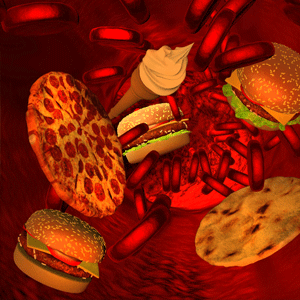
While experts continue to debate the health effects of saturated fat, a new U.S. study suggests its link to heart disease depends on what else a person eats.
Over time, cutting back on saturated fat was tied to a drop of up to 25 percent in heart disease risk unless people used refined carbohydrates like white bread or pasta as replacements. In that case, there was no benefit.
Saturated fat increases 'bad' cholesterol
"The saturated fats look benign when you compare them to the refined carbohydrates, but when you compare them to something else they're not benign," said Adela Hruby from the Harvard T.H. Chan School of Public Health in Boston, a co-author of the study.
Read: Understanding trans fats
For decades, people have been told to stay away from foods high in saturated fat, such as fatty meats, butter and cheese. Saturated fat increases the amount of LDL or "bad" cholesterol in the blood, which is linked to heart disease.
Currently, the American Heart Association recommends that saturated fats comprise no more than 6 percent of a person's daily diet. The 2010 U.S. Dietary Guidelines for Americans suggest that a maximum of 10 percent of daily calories come from saturated fats.
But recent analyses of data from past studies found no link between saturated fats and heart disease, Hruby's team writes in the Journal of the American College of Cardiology.
And other studies have found no differences when saturated fats were replaced by carbohydrates but that lack of an association might be explained by researchers not distinguishing between types of carbohydrates, the study team believes.
Their new results are based on data from nearly 130,000 people who were asked about their diets every four years, in studies conducted from the 1980s to 2010. At the start, participants were free of diabetes, cancer and heart disease. Over 24 to 30 years of follow-up, there were about 7,500 cases of heart disease.
Read: Not all trans fats are bad
People who replaced 5 percent of saturated fat calories in their diet with an equivalent amount of polyunsaturated fats – like those in fatty fish and flax seeds – had a 25 percent decreased risk of heart disease compared to those who didn't.
Those who replaced 5 percent of saturated fat with monounsaturated fats like olive or peanut oil, or whole nuts, had a 15 percent reduced risk of heart disease.
It's all about the swaps
Replacing 5 percent of saturated fat calories with an equal amount of whole grains was tied to a 9 percent reduced risk of heart disease.
But there was no difference in heart disease risk when people substituted refined carbohydrates for saturated fats.
The study's main point is that it's about the swaps people make in their diet for saturated fats, Hruby said.
"Use some olive oils instead of butter or eat a few handfuls of nuts instead of a few handfuls of potato chips," she said. "These are not complex swaps."
One limit of the study, the authors acknowledge, is that errors are possible when people are asked to estimate what foods they ate.
Dr Steven Nissen, chair of cardiovascular medicine at the Cleveland Clinic, who wasn't involved in the study, doesn't think anyone should make clinical decisions based on its results.
"As a society we need to do prospective randomised trials to answer these questions," he said.
The controversy rages on
Nissen cited the Prevention with Mediterranean Diet (PREDIMED) trial, which followed people who were randomly assigned to a Mediterranean diet with added olive oil or nuts, or a low-fat diet. Those on the Mediterranean diet had about a 30 percent lower risk of cardiovascular disease over five years.
In a follow-up email to Reuters Health, Hruby and colleagues pointed to the PREDIMED trial as an example of a prospective randomised trial that supports their finding.
Dr David Seres, director of medical nutrition at Columbia University Medical Centre in New York, said the controversy over saturated fat "will continue to rage on until we're able to do an actual and effective randomised trial, which will take hundreds of millions of dollars and decades to do."
Seres, who was not involved with the new study, believes patients are still going to be advised by their doctors to limit saturated fats.
"It's my opinion that that's going to turn out to be correct, but again I wish I had better data to be sure of my advice," he said.
Read more:
Mediterranean diet linked to better heart health
Heart health: low-carb diet best
Saturated fat may not cause heart disease after all
Image: Saturated fats blocking the arteries from iStock




 Publications
Publications
 Partners
Partners











